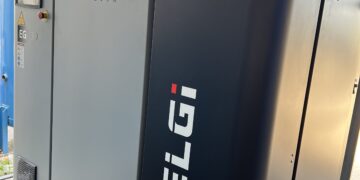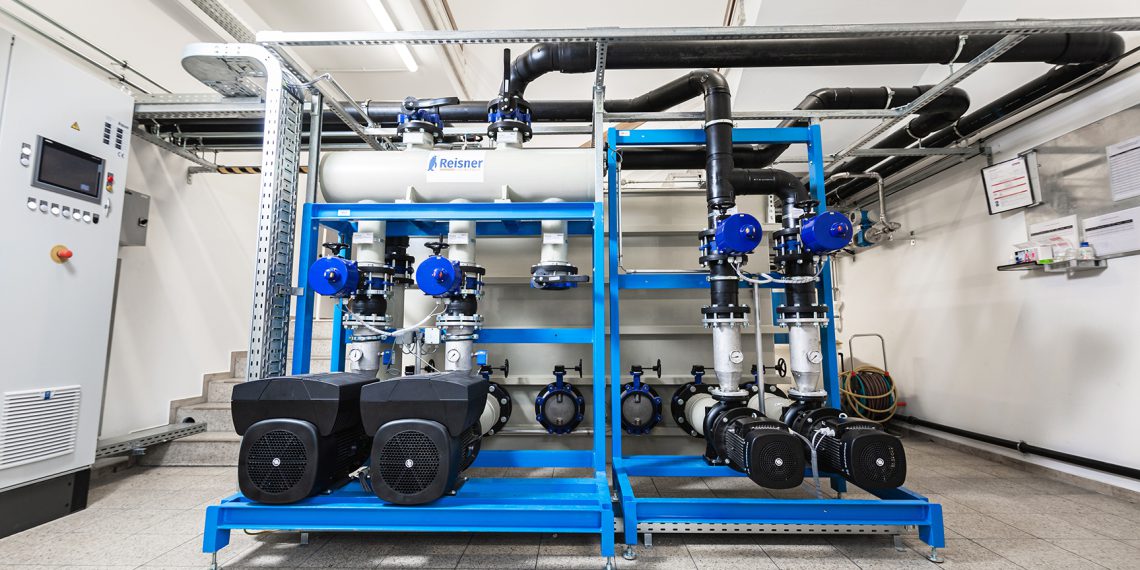The investment at the Warendorf site, the so-called “Technology Center Plastics”, became necessary when an old closed system from Miele with a hybrid evaporative cooler was sent into well-earned retirement after 25 years. The new solution enables the provision of water at a temperature of 30 °C even at high outside temperatures of up to 35 °C.
In the system used by the group until then, the water came into direct contact with the ambient air and led to a high level of dirt entering the treated make-up water. This is because the cooling principle is based on the evaporation effect. Water is continuously lost in the process. In addition, the circulating water must be elaborately filtered and inoculated with water additives. Extensive monitoring due to an increased risk of contamination, for example with legionella and other bacteria, makes this an increasingly important and maintenance-intensive task.
The alternative to open cooling systems are closed free-cooling systems that dissipate heat to the environment via an air-water heat exchanger. They come within about 5 Kelvin of the outside temperature. So if a water supply temperature of 30 °C is required, this conventional technology will work without any problems up to an outside temperature of 25 °C. If it is warmer outside, additional cooling must be added via spraying, the addition of city water or an additional refrigerating machine in order to maintain the 30 °C water supply temperature.
The special feature of the new Reisner solution is its combination with the PAD system, which also enables cooling at high outside temperatures via humidified honeycombs. This not only saves Miele time and money, but also meets the company’s own demand for high-quality solutions. Alexander Wibe, Head of Plant Technology, describes this as follows: “We were looking for an energy-saving solution that also leaves nothing to be desired in terms of technology. The cooling system had to be of high quality and rely on well-known components. Low-maintenance, reliable and efficient, coupled with a 24-hour service in the event of an emergency — that was the overall package required.”
From Warendorf, the company supplies all appliance plants of the Miele Group. The product range includes complex assemblies such as washing machine doors or dryer sieves, multi-component parts and parts with high-gloss surfaces such as hoover housings. According to its own statement, 60% of the plastic parts installed in German Miele appliance plants come from Warendorf. In addition, the plant, which was founded in 1975 and employs around 300 people, oversees plastics production at Miele sites in Uničov (Czech Republic), Dongguan (China) and Ksawerów (Poland).
The decision in favour of Reisner was ultimately an easy one: “From costs to technology to comprehensive service, Reisner offered the best package,” says Wibe. In the uncomplicated and customer-oriented planning phase, the Reisner project team explained which individual solution they would like to use.
Close partnership with individual solution
The special feature is the closed system in which a V‑shaped, self-draining free cooler is installed. The honeycomb structure of the PAD system is only moistened with city water when high outside temperatures of around 25 °C and above make this necessary. When the air flows through this structure, it cools down — as is usual with adiabatic cooling. Then the process heat is dissipated to the cooled air by means of a CU/Al heat exchanger (not by evaporation).
“The decisive factor here is that the spraying water does not come into contact with the heat exchanger. The heat is almost completely dissipated via the air, making the system a reliable and cost-effective cooling solution.”
- Günter Sareyko, Head of Sales at Reisner Cooling Solutions GmbH
In total, the new system offers a recooling capacity of up to 500 kW and reliably ensures the desired process temperature at up to 35 °C outside temperature. Reisner has also thought along when it comes to maintenance. Easy replacement of the PADs, which already provide a service life of three to five years depending on use, was just as important as minimised water consumption and the use of durable materials.
“Miele not only saves energy through its special design, the components themselves are also designed to be energy-saving,” says Reisner. The fail-safe dual-pump system with a volume flow of up to 87 m³/h is speed-controlled, as are the 14 fans with EC motors. The humidification itself is also multi-stage. The built-in return filter works completely pressureless and can be changed during operation. Reisner thus reduces the energy required in each process step to a minimum.
After the system has been running since October 2020, Wibe is more than satisfied: “The quick delivery and commissioning during operation without the installation of rental refrigeration were optimal. Reisner always worked cleanly and conscientiously, so our expectations were absolutely met.” This also includes, for example, the control cabinet construction according to Miele specifications or the uncomplicated communication during the entire project.
Wibe is not yet able to precisely quantify the cost and time savings, but is very positive after the first experiences. “The early findings show that energy consumption has dropped significantly. The plant runs very stably and we have managed to completely dispense with the use of chemicals.”
Additional optimisation with full-flow filtration
The group’s high standards are also evidenced by the decision to use an additional filter solution and chemical-free water treatment. Even after a short period of use, the water quality showed a steady improvement due to the water treatment with full-flow filtration in the return flow. The system dissolves lime and corrosion compounds by means of low-frequency electromagnetic alternating fields. These can then be filtered out of the water accordingly. “Miele stands for quality. We are therefore very pleased that we can contribute to this image with our cooling expertise,” Günter Sareyko sums up.

















